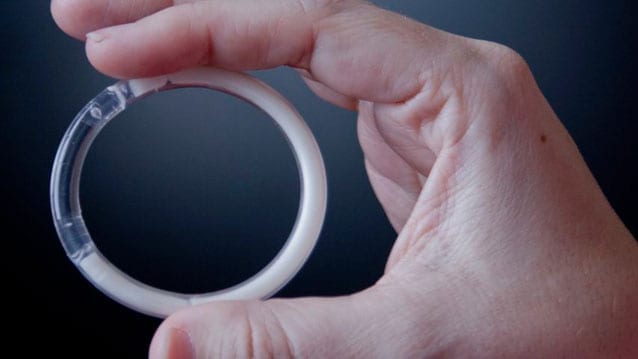
Intravaginal ring providing dual protection is first of its kind to enter a clinical trial
Women’s reproductive health may never be the same, thanks to Northwestern University biomedical engineer Patrick Kiser and his first-of-its-kind intravaginal ring that reliably delivers an antiretroviral drug and a contraceptive for months.
Kiser’s one ring delivers two drugs that do three important things: the device is designed to protect against HIV and herpes as well as unwanted pregnancy. It will be the first device with the potential to offer this protection to be tested in women.
The easy-to-use ring delivers controlled doses of tenofovir (a common antiretroviral drug) and levonorgestrel (a contraceptive) for 90 days. The rings are being manufactured now, and the device soon will undergo its first test in women.
Details of the development of the ring, a device that represents a lot of ‘firsts,’ was published March 5 by PLOS ONE, a peer-reviewed, open-access online journal.
According to the World Health Organization, 35 million people around the world live with HIV, and 222 million women would like to delay or stop childbearing but are not using any method of contraception.
“I suspect women will use the ring primarily for contraception, but they also will benefit from protection against sexually transmitted diseases,” said Kiser, an expert in intravaginal drug delivery. “And for women in the developing world in particular, unwanted pregnancy can have significant health, economic and cultural consequences. We want to motivate women to use this ring.”
The ring, 5.5 centimeters in diameter, is simple yet complex. Kiser and his colleagues worked painstakingly for five years, engineering the three materials that make up the ring and optimizing the device to reliably deliver fixed and efficacious doses of two medicines over a long period of time.
“A lot of engineering has gone into developing the ring,” said Kiser, senior author of the paper. “It represents two Ph.D. theses — one Ph.D. for the larger section containing the antiretroviral drug and another Ph.D. for the smaller section containing the contraceptive.”
Kiser is a faculty member in the department of biomedical engineering at the McCormick School of Engineering and Applied Science and in the department of obstetrics and gynecology at Northwestern University Feinberg School of Medicine.
The ring is easily inserted in the vagina and stays in place for three months. And because the tenofovir is delivered at the site of transmission, the ring — known as the tenofovir levonorgestrel IVR — utilizes a smaller dose than pills. The levonorgestrel released by the ring is the same drug as that used in certain contraceptive pills and in an intrauterine device.
“This system represents a significant advance in vaginal drug delivery technology and is the first in a new class of long-acting multipurpose prevention drug delivery systems,” say the authors in the study. They also report details of the ring’s engineering, safety, stability and drug release.
“The differences between the two drugs are huge, which presented us with a design challenge,” Kiser said. “Tenofovir is highly water soluble while levonorgestrel is highly water insoluble. And the daily dose is different: the ring delivers about 10 milligrams of tenofovir and only 10 micrograms of levonorgestrel. Our scientific hurdle was finding a way to manufacture a dual-purpose ring that got the device into the clinic.”
Tenofovir is taken orally by 3.5 million HIV-infected people worldwide, and it also has been studied as a gel. The drug inhibits HIV and HSV-2 (herpes simplex virus-2) replication in susceptible cells.
Previous studies have demonstrated that antiretroviral drugs can prevent HIV infection, but existing methods for delivering the drug fall short. Pills must be taken daily and require high doses; some women may prefer a longer-lasting method, such as the ring, versus methods used at the time of sex, such as a gel.
Kiser’s combination ring promises much more. The strength of the device stems from its unique polymer construction: its elastomer swells in the presence of fluid (such as that found in the human body), delivering up to 100 times more of the tenofovir than current intravaginal ring technology, which have release rates that decline over time.
“Products only work when they are used,” said co-author David Friend, product development director at CONRAD, which develops reproductive health technologies for low-income countries and is affiliated with Eastern Virginia Medical School.
“By having a ring that can remain in the body for up to 90 days, our hope is that this ring will offer a solution to increase adherence, and therefore provide greater protection against HIV while also preventing pregnancy,” he said.
The Latest on: Birth control
[google_news title=”” keyword=”Birth control” num_posts=”10″ blurb_length=”0″ show_thumb=”left”]
via Google News
The Latest on: Birth control
- My wife is refusing to take birth controlon April 25, 2024 at 7:26 pm
However, after giving birth to our third child two years ago, I asked her to consult a doctor on the best birth control method but until now, she has not. She says we should only use natural methods ...
- What Are the Side Effects of Birth Control?on April 25, 2024 at 6:16 am
Birth control skin patches, such as Xulane or Twirla, contain both estrogen and progestin hormones. They are similar to the pill in terms of how effective they are in pregnancy prevention. Common side ...
- Rosen joins on to bill guaranteeing birth control access in pharmacieson April 24, 2024 at 8:03 pm
WASHINGTON D.C. (KOLO) - U.S. Senator Jacky Rosen is joining on to a bill that would guarantee access to birth control at pharmacies. The Access to Birth Control Act would aim to ensure that no one ...
- TikTok is full of misleading information about birth control—wellness influencers are helping drive these narrativeson April 24, 2024 at 10:40 am
There's been an increase in content posted on TikTok and Instagram recently discussing the alleged dangers of birth control. Content creators have shared concerns about the pill's side-effects ranging ...
- Michigan Legislature considers bills to allow pharmacists to prescribe birth controlon April 22, 2024 at 1:58 pm
LANSING, Mich. (CBS DETROIT) - The Michigan Legislature is considering two bills that could make getting access to hormonal birth control a little easier. "We find ourselves in an OB-GYN kind of ...
- Birth Control Online in 2024: 9 Best Optionson April 21, 2024 at 5:00 pm
Here’s our process. Nurx accepts insurance, so people with insurance may be able to get birth control for free. Without it, birth control options start at $15. Before ordering from Nurx ...
- What Is the Birth Control Patch?on April 19, 2024 at 5:30 am
The birth control patch is a method of contraception you wear on your skin to prevent pregnancy. Using it correctly is important to its effectiveness.
- How Much Opill, the Over-the-Counter Birth Control Pill, Actually Costson April 18, 2024 at 4:00 pm
The first over-the-counter (OTC) birth control pill was approved last year. Over the past month or so, it has finally started showing up on pharmacy shelves. And we’re finally able to answer those ...
- Listen to Women—Birth Control's Side Effects Are Real | Opinionon April 17, 2024 at 6:03 am
Due in large part to social media, young women in particular are speaking out about their negative experiences taking these drugs.
- Social media algorithms may skew perceptions of the risks of birth controlon April 15, 2024 at 10:30 am
Myths about birth control are as old as the hills. But social media platforms, in particular TikTok and Instagram, are allowing false information to proliferate in new and dangerous ways.
via Bing News










